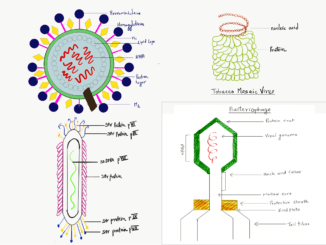
Plasma membrane: Definition and Composition
Definition A plasma membrane is defined as a covering or envelope which encloses almost all types of cells whether it is plant or animal. It […]

Definition A plasma membrane is defined as a covering or envelope which encloses almost all types of cells whether it is plant or animal. It […]

Difference between animal, plant virus, and bacteriophage Viruses are very small even smaller than bacteria and are mainly parasitic in nature. Depending upon the host, […]

Introduction There is no nomenclature system for virus classification since they are not considered truly living. As we all know living organisms have a definite […]

Virus definition In Latin, the word virus means poisonous or venomous fluid coined by Dmitri Ivanowsky (1892). He recognized certain microbes causing mosaic diseases of […]
Copyright © 2024 | WordPress Theme by MH Themes